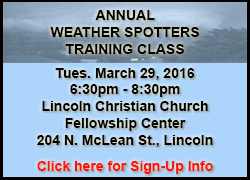|
 Chamber Ag Committee Chairman Betsy Pech introduced now Dr. Wrage,
who was her student at Hartsburg-Emden, a graduate and recipient of
a 1999 Logan County Ag Day Scholarship. Pech said in high school,
Wrage was on the first Hartem Ag Issues team that went to the State
Competition and was a Silver Emblem Team at the National FFA
Convention. Chamber Ag Committee Chairman Betsy Pech introduced now Dr. Wrage,
who was her student at Hartsburg-Emden, a graduate and recipient of
a 1999 Logan County Ag Day Scholarship. Pech said in high school,
Wrage was on the first Hartem Ag Issues team that went to the State
Competition and was a Silver Emblem Team at the National FFA
Convention.
Pech said, "Wrage earned his Bachelor of Science and DVM degrees
from the University of Illinois where his activities included
serving as President of the agriculture fraternity Alpha Gamma Rho
and founding the Fighting Illini Bass Fishing Club."
Since graduating in 2007, Dr. Wrage has worked in a mixed animal
practice in western Illinois and a small animal practice in
Edwardsville. In 2013, he and his wife Elizabeth returned to the
Logan County area where he is an associate veterinarian at
Greenhaven Animal Clinic and Best Friends Animal Hospital.
Wrage began his presentation by congratulating this year's
scholarship recipients and thanking the board for the opportunity to
address the scholarship winners and guests.

Wrage then said, "I need everyone to picture: It's Illinois, it's
January and you've just signed up for a seven day getaway. Anyone
for skiing in Colorado or maybe snow machining up in the U.P. [Upper
Peninsula of Michigan]?" He asked guests to raise their hand if they
could envision going to the beach and being in the warm sun, and
said that is what the average person would probably do.
Wrage said, "I think those are great ideas as well, but
unfortunately, I did not have that opportunity. My destination was
quite different. I ended up in central Alaska to volunteer as a team
veterinarian for the Copper Basin 300 Dog Sled Race."
Wrage said for several years a classmate of his has been asking him
and other classmates to come help with one of these races, but it
was not until this January that he took her up on the offer. He
said, "My job was to ensure the health of the sled dog team. I did
not realize at the time what the entire team consisted of. . . I had
no idea what to expect."
Wrage did a quick Google search and found last year's average
temperature for the race was 33 degrees below zero. He said, "I can
tell you in my almost ten years as a mixed animal veterinarian in
Illinois, I have gotten to experience pretty extreme weather, but
this had me a little bit nervous."
Wrage said, "a two page long packing list tested my ability to beat
the airline baggage requirements, but I did succeed, and 24 hours
later, I was in Glennallen, Alaska preparing for the race." He said,
"Before I left, I stated my only goal was really to return with all
my digits and no frostbite, and to see the Northern Lights."
Wrage then described the race and what was involved in getting ready
for it. The Copper Basin 300 Dog Sled Race is considered by many to
be one of the toughest races, but finishing it is a requirement for
those who want to compete in the Iditarod or the Yukon Quest.
Wrage said the race consists of 48 teams with twelve dogs per team,
one musher, and one handler. Along the race, there are four check
stations and only 18 hours of mandatory rest for the mushers and the
dog teams. Each check station has a site for the teams to camp which
consists of where they park the sleds on the straw or snow for the
dogs and mushers to sleep. Prior to the race, each team drops bags
of food for supplies at each checkpoint.
Wrage said all 500 dogs in the race had to have a pre-race medical
inspection and exam. During the race, the veterinarians examined all
of the dogs as they came in and out of the checkpoints. They would
talk with each musher about the team, look over the dogs, do an
exam, and provide any medical treatment necessary.

Wrage said what he found most interesting about the experience was
not necessarily the medical aspects, but rather the dynamics that go
into the dog team and the race. He said, "The interaction between
the dogs and the handlers is obvious. The mushers and the volunteers
were intriguing to watch."
He said, "Maybe it was the lack of sleep or prospect of waiting in
the dark and cold for the next team to arrive, but it got me
thinking not only about these teams, but other teams in my life,
both ones I had been with in the past and the ones I am part of
today."
Wrage asked the question, "What do you think makes up a team, your
team, and where do you fit on that team?" He said, "In the race
setting, when you think of a team, everyone thinks of the dogs and
mushers, but there is a lot more to the team than that. The team
includes the dogs and the mushers, but also includes the handlers,
the veterinarians, the organizers, the trailblazers, and
volunteers."
According to Wrage, the musher is more than just a rider, and "race
rules say, only the musher can handle, feed, and care for the dogs.
They are not allowed to receive any assistance" unless the vet team
goes out to give medical care.
Wrage said during the race, the musher must have food provisions for
himself and the dogs in addition to emergency equipment like axes,
fuel, and snowshoes to survive the harsh climate. The mushers must
also be fit since they have to help push their sleds up the 2,000
foot altitude during the race. Even during heavy snow, the mushers
have to don their snowshoes and go ahead of the team to break the
trail for the team as they continue racing.

[to top of second column] |

Wrage said the canine portion of the team typically has twelve dogs
with one to two lead dogs guiding them. Besides keeping the team on
the trail, the lead dogs are expected to be more attuned to the
commands of the musher and more resistant to distractions on the
trail.
Next to the lead dogs are the swing dogs, which are the second to third pairs of
dogs. Wrage said in addition to providing power, they must follow the turns of
the lead dogs to help keep the dog sled steady.
He said the next key dogs in line are primarily for pulling and maintaining
speed and the last group is the wheel dogs, who are important in turning and
stabilizing the sled.
Wrage said, "The Copper Basin 300 had another member of their team that really
shocked me. With $15,000 on the line, it was pretty surprising to see how much
the mushers worked for each other." He said mushers were willing to help with
small things like sharing parts for the sled, if another team had a breakdown on
the trail, to big things like lending a ride and helping other mushers catch up
and locate a lost dog team.
Some may wonder how a musher can lose a dog team while in a race, but Wrage
asked the audience to picture themselves on the back of a dog sled being pulled
by dogs at up to 15 miles an hour. He said it is dark for 16 hours, the average
temperature is between two and twenty below, and the musher is getting two to
three hours of sleep per day for the last three days of the race.
Wrage said with a slight change in the trail or a bump or a branch catching
mushers off guard and knocking them off the sled, within seconds the team can be
hundreds of feet away before they even realize what happened. There is no way to
catch up to that team unless another competitor gives them a ride to catch up
and find where the team actually did stop.
Wrage said, "I gained appreciation for the camaraderie between the teams.
Surprisingly, it turns out, the severe challenges and risks mushers encounter in
the race tend to make the contestants more reliant on each other in this type of
event."
He said it made him feel that is how life is as well, "Given the opportunity to
be 'behind the scenes' showed the hidden members of the team as well. We all
know who those people are in our lives."

Wrage said parts of the "race team" worked in the background, such as the
dedicated people who made up the race committee and spent the previous year
fundraising.
Another team rode ahead on snow machines to check for dangers along the route
for the race. This group had the biggest role in keeping the teams on the trail
and keeping them safe throughout the entire race.
Wrage said, "I could see how a team was not just a musher or a lead dog . . .but
countless people that helped me through the race." He said, "Regardless of where
you sit in a team, you need to know your purpose. Each team member must fulfill
their purpose for the entire race to be a success."
Wrage said the goal is to work in unison to win the race and "without all the
team members, it will not be a success."
Wrage said to the scholarship recipients, "As you finish your senior year in
high school or college, your most recent experiences may have been as that lead
dog or the musher. Now as you enter a new college, career, or new career
experience, you're probably not going to be the lead dog for a while or even a
musher."
Wrage asked the questions, "Where do you fit and the bigger question is, what
are you learning while you are there? Be observant of who makes up your team.
The players may come and go, but the whole team is what helps you grow as you
head towards the finish line."
Wrage said, "Ask yourself who you name as team members. Are they teachers,
coaches, academic advisors, friends, [or] bosses? As I think back to my team
throughout the years, I can still name many of the team members; some I chose,
some who chose me, and some who I did not even know who were there." Some have
been there since the beginning and some have yet to be part of your team, he
said.
Wrage said Dr. Bill, his mentor during high school, is now a colleague and
co-worker. He said another team member is Betsy Pech, his teacher, FFA Advisor,
and advocate who now works by his side as a team member on a school board.
In closing, Wrage asked recipients and everyone else, "Have you considered who
is on your team? Who do you need on your team?"
[Angela Reiners]
 |